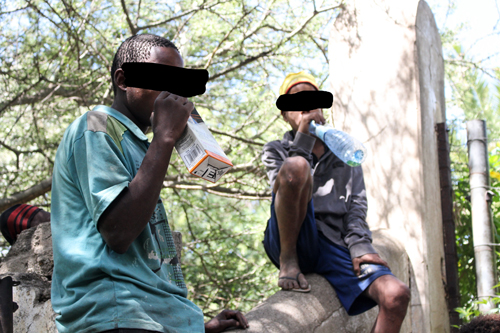Some of the homeless children in Windhoek say they have turned to sniffing glue with the hope of forgetting their problems, including hunger.
New Era recently engaged two street children, who spoke openly about their addiction to petrol and other harmful inhalants in order to curb their hunger pains and other stressful circumstances on the street.
For Marius (18) and his younger brother Dibasen (15), every day of the past five years has been a struggle to survive, which is made even harder by high levels of drug use.
The siblings have been living in an abandoned house in Windhoek West, sleeping on boxes and begging strangers for money to buy food.
On a bad day when there is no good Samaritan to offer them food, the two boys resort to sniffing petrol, saying it helps suppress the appetite.
The dirty containers used for sniffing petrol are a visible clue of what life is like for the homeless kids. “If we sniff today, we can survive a day or two without eating. It helps,” says Marius, as he took out a container of petrol.
Tucked under Dibasen’s grimy, torn shirt is a half-empty silver glue tin. The adhesive glue contains methylbenzene, a sweet-smelling, intoxicating hydrocarbon, which is neurotoxic. When asked what they use it for, the innocent-looking boy confessed they also sniff glue to help them feel relaxed and also numb them to the biting cold. He described it as a coping mechanism and an escape from their harsh reality.
“It helps me relax and forget all my problems,” he says, taking a break so he can draw the strong, lethal fumes into his young lungs.
Asked if they are aware of how dangerous the substances are, Dibasen innocently shook his head, while Marius reminisced on the day he passed out after smoking the harmful inhalants.
“I know it is dangerous because a few weeks ago, I almost suffocated just after sniffing; I never wanted to sniff glue or petrol, but my friends coaxed me into sniffing it,” said Marius, who refused to mention where they find the substances.
“If we tell you, you will block our ways of getting it,” he added.
Both Marius and Dibasen confirmed they often have chest pains and fall sick at times but continue to sniff the harmful substances. Hailing from Gobabis, the two revealed they ran away from home after their mother passed on in 2016. A government social worker, who preferred anonymity, told New Era the number of street kids is increasing daily. “These kids are exposed to risk in the streets, yet most of them choose to remain on the streets even when they can return to their houses,” she said.
As much as these children continue to choose the streets or spin the stories, justifying their being on the streets, she said the child welfare ministry conducts regular visits on the streets to monitor the density of the street kids.
This is done with the support of other stakeholders.
She said children are removed from the street and taken to the After School Centre in Katutura, a government initiative, fully funded and resorts under the ministry of child welfare.
The ministry’s spokesperson Lukas Haufiku said measures to rehabilitate these children are undertaken based on the individual and unique needs. According to Haufiku, a total of 48 children, of whom nine are female and 39 males, received psychosocial support and were taken back to their respective regions.
“The age of these children ranges from eight to 21 years. Most of the children hail from Gobabis and surrounding towns such as Witvlei and Leonardville,” he said, adding that the ministry has encountered a total number of 65 children. So far, the ministry has integrated 147 children living and working in the streets last year, and ten children have been placed in residential childcare facilities in various parts of the country, where they are faring well in terms of well-being and especially academically.
- ashikololo@nepc.com.na


